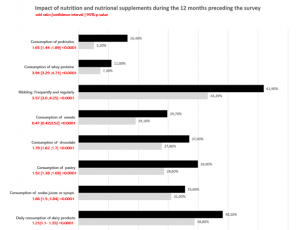Daily consumption of sweets, cakes and unhealthy foods associated with acne, new study reveals
LONDON, UNITED KINGDOM, October 11, 2019 /EINPresswire.com/ -- Poor dietary habits, increased stress and harsh skincare routines are among the most significant factors associated with acne, a new study has found1.
The research presented today at the 28th EADV Congress in Madrid, evaluated the exposure to different worsening factors on acne more than 6,700 participants across six countries in North America, South America and Europe. It is the first research of its kind, analysing both external and internal factors that can influence acne.
The results of the study showed that significantly more (P<0.001) individuals with acne (48.2%) consume dairy products on a daily basis compared to individuals who did not (38.8%). The difference was also statistically significant (all p<0.001) for soda juices or syrups (35.6% vs 31%), pastries and chocolate (37% vs 27.8%) and sweets (29.7%vs 19.1%). Surprisingly 11% of acne sufferers consume whey proteins versus 7% without acne, and 11.9% of acne sufferers consume anabolic steroids versus 3.2% without acne.
Commenting on the findings, lead researcher Professor Brigitte Dréno conducting the research on behalf of Vichy Laboratories states: “Acne is one of the most common reasons why people with skin issues contact a dermatologist. Its severity and response to treatment may be influenced by internal and external factors, which we call the exposome. For the first time, this study allows us to identify the most important exposome factors relating to acne from patient questioning prior to any treatment prescription.”
Exposure to pollution or to stress were also more frequently observed in participants with acne compared to control participants. The research also found that harsh skincare practices were more common in acne sufferers.
Conversely, tobacco, which has previously been showed as a potential acne trigger, was not shown to have an influence.
Acne is estimated to affect one in 10 people globally, making it the eighth most prevalent disease worldwide2. It has been recently reported that acne affects also up to 40% of adult females3.
Due to its visible nature, acne has a significant psychological impact on patient’s quality of life and self-esteem. Sufferers have been shown to have higher levels of anxiety4 than the general population, feel socially isolated and have a lower chance of being selected for employment5.
Looking to the future, Professor Dréno adds, “Understanding, identifying and reducing the impact of exposome is important for an adequate acne disease management as it may impact on the course and severity of acne as well as on treatment efficacy”.
ENDS
Notes to Editors
A reference to the 28th EADV Congress must be included when communicating any information within this press release.
For further information, to speak to an expert or for references email phoebe@spinkhealth.com or call +44 7732 499 170
The research presented today at the 28th EADV Congress in Madrid, evaluated the exposure to different worsening factors on acne more than 6,700 participants across six countries in North America, South America and Europe. It is the first research of its kind, analysing both external and internal factors that can influence acne.
The results of the study showed that significantly more (P<0.001) individuals with acne (48.2%) consume dairy products on a daily basis compared to individuals who did not (38.8%). The difference was also statistically significant (all p<0.001) for soda juices or syrups (35.6% vs 31%), pastries and chocolate (37% vs 27.8%) and sweets (29.7%vs 19.1%). Surprisingly 11% of acne sufferers consume whey proteins versus 7% without acne, and 11.9% of acne sufferers consume anabolic steroids versus 3.2% without acne.
Commenting on the findings, lead researcher Professor Brigitte Dréno conducting the research on behalf of Vichy Laboratories states: “Acne is one of the most common reasons why people with skin issues contact a dermatologist. Its severity and response to treatment may be influenced by internal and external factors, which we call the exposome. For the first time, this study allows us to identify the most important exposome factors relating to acne from patient questioning prior to any treatment prescription.”
Exposure to pollution or to stress were also more frequently observed in participants with acne compared to control participants. The research also found that harsh skincare practices were more common in acne sufferers.
Conversely, tobacco, which has previously been showed as a potential acne trigger, was not shown to have an influence.
Acne is estimated to affect one in 10 people globally, making it the eighth most prevalent disease worldwide2. It has been recently reported that acne affects also up to 40% of adult females3.
Due to its visible nature, acne has a significant psychological impact on patient’s quality of life and self-esteem. Sufferers have been shown to have higher levels of anxiety4 than the general population, feel socially isolated and have a lower chance of being selected for employment5.
Looking to the future, Professor Dréno adds, “Understanding, identifying and reducing the impact of exposome is important for an adequate acne disease management as it may impact on the course and severity of acne as well as on treatment efficacy”.
ENDS
Notes to Editors
A reference to the 28th EADV Congress must be included when communicating any information within this press release.
For further information, to speak to an expert or for references email phoebe@spinkhealth.com or call +44 7732 499 170
Phoebe Deans
Spink
+44 1444 811099
email us here
Legal Disclaimer:
EIN Presswire provides this news content "as is" without warranty of any kind. We do not accept any responsibility or liability for the accuracy, content, images, videos, licenses, completeness, legality, or reliability of the information contained in this article. If you have any complaints or copyright issues related to this article, kindly contact the author above.

